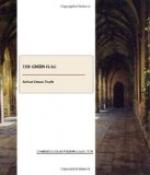Hilary Joyce was disappointed that there were no dervishes. It would have been a great start for him in the Egyptian army had he fought a little action on his own account. But even as it was, he had a rare chance of impressing the authorities. He would love to show his capacity to the head of the Intelligence, and even more to that grim Chief who never forgot what was smart, or forgave what was slack. The prisoner’s dress and bearing showed that he was of importance. Mean men do not ride pure-bred trotting camels. Joyce sponged his head with cold water, drank a cup of strong coffee, put on an imposing official tarboosh instead of his sun-helmet, and formed himself into a court of inquiry and judgment under the acacia tree. He would have liked his people to have seen him now, with his two black orderlies in waiting, and his Egyptian native officer at his side. He sat behind a camp-table, and the prisoner, strongly guarded, was led up to him. The man was a handsome fellow, with bold grey eyes and a long black beard.
“Why!” cried Joyce, “the rascal is making faces at me.” A curious contraction had passed over the man’s features, but so swiftly that it might have been a nervous twitch. He was now a model of Oriental gravity. “Ask him who he is, and what he wants?” The native officer did so, but the stranger made no reply, save that the same sharp spasm passed once more over his face. “Well, I’m blessed!” cried Hilary Joyce. “Of all the impudent scoundrels! He keeps on winking at me. Who are you, you rascal? Give an account of yourself! D’ye hear?” But the tall Arab was as impervious to English as to Arabic. The Egyptian tried again and again. The prisoner looked at Joyce with his inscrutable eyes, and occasionally twitched his face at him, but never opened his mouth. The Bimbashi scratched his head in bewilderment.
“Look here, Mahomet Ali, we’ve got to get some sense out of this fellow. You say there are no papers on him?”
“No, sir; we found no papers.”
“No clue of any kind?”
“He has come far, sir. A trotting camel does not die easily. He has come from Dongola, at least.”
“Well, we must get him to talk.”
“It is possible that he is deaf and dumb.”
“Not he. I never saw a man look more all there in my life.”
“You might send him across to Assouan.”
“And give someone else the credit? No, thank you. This is my bird. But how are we going to get him to find his tongue?”
The Egyptian’s dark eyes skirted the encampment and rested on the cook’s fire. “Perhaps,” said he, “if the Bimbashi thought fit—” He looked at the prisoner and then at the burning wood.




